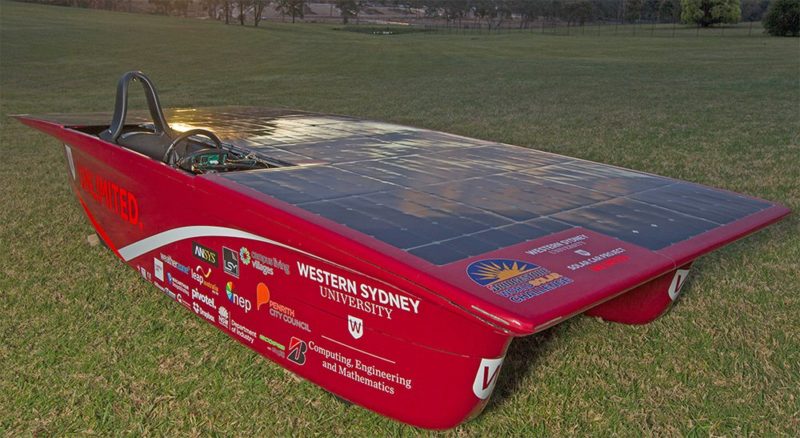In what has turned out to be a flying start to the biannual American Solar Challenge (ARC), students from the Western Sydney University Solar Car Team have pipped the competition at the post in the first stage of the race.
With the University of Michigan team hot on their heels, the students completed the initial 773km leg of the 2,800km solar car race in searing conditions with just three minutes to spare.
Open to college and university students, the race is conducted in four stages in total, starting in Nebraska and finishing in Oregon.
Prior to the main race, the cars must complete the qualifying Formula Sun Grand Prix, a closed road race which tests the abilities of the solar cars on curves, and the limits of their braking and acceleration, and in which the WSU team came second.
Starting off on the main race on July 15 in their second generation UNLIMITED 2.0, the WSU team ran a tight race, coming in just behind the University of Michigan on the second day of racing.
With a miraculous reappearance of the sun at Scott’s Bluff National Monument on the Oregon Trail at the end of the first day, the team were able to recharge the UNLIMITED 2.0 for the final day of the first leg.
The sun has finally made an appearance at Scott’s Bluff National Monument, just in time for evening charging. #ASC2018 #NPS @WestSydSolarCar pic.twitter.com/WtrCEF1VuI
— ASC Solar Racing (@ASC_SolarRacing) July 15, 2018
The sweltering heat saw many a team pull out and abandon the race, but not the WSU team whose experience racing in the Bridgestone World Solar Challenge from Darwin to Adelaide has already seen them face the Australian desert three times, finishing in 6th position in 2017.
It’s the second race for the UNLIMITED 2.0, which is a catamaran-style 4.6m long solar car made from a carbon fibre and Nomex Honeycomb body powered by a lithium-ion battery.
The win placed the team gain first place for the second leg of the race, and they have since rolled in to the Caspar checkpoint in second place.
Western Sydney @WestSydSolarCar is the second team into the Casper checkpoint! #ASC2018 pic.twitter.com/ab80D3ZSXe
— ASC Solar Racing (@ASC_SolarRacing) July 16, 2018
The fantastic results are all due to the diligent work of the WSU engineering students, who have worked hard to ensure the reliability of the on-board systems.
The WSU team is made up of students hailing from the fields of Engineering, Industrial Design and Visual Communications, and they are responsible for all facets of the team’s success from production and design of the vehicle to marketing, sponsorship and administration.
The race still has over 1,000km to go and is expected to be completed by July 22, after which finishing teams will have crossed four states over 10 days.
To follow the Western Sydney University Solar Team, find them on Twitter, Instagram or track them live while they finish their journey to the finish line.

Bridie Schmidt is associate editor for The Driven, sister site of Renew Economy. She has been writing about electric vehicles since 2018, and has a keen interest in the role that zero-emissions transport has to play in sustainability. She has participated in podcasts such as Download This Show with Marc Fennell and Shirtloads of Science with Karl Kruszelnicki and is co-organiser of the Northern Rivers Electric Vehicle Forum. Bridie also owns a Tesla Model Y and has it available for hire on evee.com.au.


